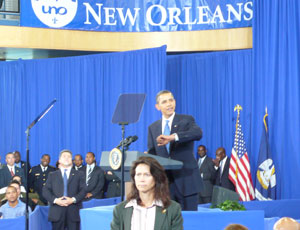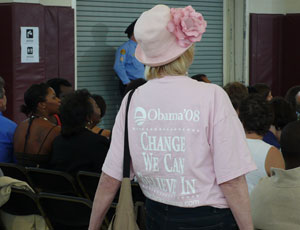New Orleans, we won’t forget you, President Barack Obama said during a visit to the city October 15.
The President and his cabinet will continue to assist the recovery and future protection of New Orleans and the Gulf Coast region, both of which he says are critical to the nation’s environmental and economic vitality. He made his pledge while acknowledging the administration has other formidable challenges in reviving the economy and overhauling health care


“I promise you, we will not forget about New Orleans,” Obama said at a town hall meeting on the campus of the University of New Orleans.
How many resources the administration will devote to the Gulf Coast remains unclear.
On August 26, the administration announced the formation of a federal interagency task force to oversee the ongoing economic and environmental restoration work in the Gulf Coast. Yet more than a month after the announcement, the president offered no specific agenda of the task force. Nor did he announce any new legislation or funding supporting coastal restoration or recovery efforts.
For the most part, the town hall audience cheered Obama.
“Katrina was caused not just by a disaster of nature, but a breakdown of government,” Obama said. To ensure that breakdown won’t happen again, the Obama administration has sent more cabinet members to the Gulf Coast than any other area in the country, he says. “We’re also focusing on preparedness and response so history doesn’t repeat itself, so a disaster like this doesn’t happen again. We’ve formed a group led by Janet Napolitano to improve disaster recovery across the country.”
Obama compared Hurricane Katrina to the economic storms currently assailing the nation. He compared the American Recovery and Reinvestment Act, which “has put thousands of Gulf Coast residents back to work,” to the ongoing recovery in New Orleans. “We’ve seen 220 miles of levees repaired, but it’s not enough,” he said. Referring to the nation’s economic health, Obama says he wants to see “not only stock market prices rising again, but businesses hiring again. If we want a recovery that lasts, and an economy that grows again, we need to build stronger.”
Obama said such sweeping changes will not be solely supported by the Federal, state and local governments, but must be driven by the people of the nation. “I never said it was going to be easy. Change is hard, and big change is harder.” But he asked the nation to follow the example of the resiliency of New Orleanians. “Katrina may have swept through this city, but it did not destroy this community,” he said. “That doesn’t start in Washington. That starts here with the people.”
Although the red-state audience was overwhelmingly supportive of the president, drowning out many of his comments with cheers and applause, he was questioned about a few key issues. One man wanted to know why Federal Emergency Management Agency reimbursements for building are still stymied. “Delgado, the largest vocational technical college in the area, had to turn away students because FEMA is only offering to pay $19 million of the more than $40 million in damages the campus received in Katrina,” the man said. “I expected as much from the Bush administration, but why are we still being nickel and dimed?”
The president responded by singing the praises of the new FEMA director, Craig Fugate, who is “working ‘round the clock to deal with the backlog.” He also noted revisions introduced by Senator Mary Landrieu that should help facilitate the process. “One thing I have learned as president is that everybody will attack you for spending money unless you are spending it on them,” Obama said.



Post a comment to this article
Report Abusive Comment